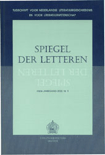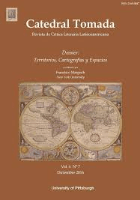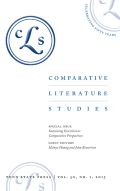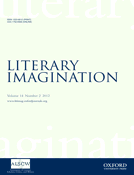
SPIEGEL DER LETTEREN
Scope & Guideline
Bridging Past and Present in Literary Exploration
Introduction
Aims and Scopes
- Exploration of Dutch Literary History:
The journal delves into the historical evolution of Dutch literature, analyzing significant authors, movements, and texts from the Middle Ages to the present. - Cultural and Social Contexts in Literature:
A core focus is on how literature interacts with cultural, social, and political contexts, including issues like migration, identity, and memory. - Literary Criticism and Theory:
The journal publishes critical essays that apply various literary theories to analyze texts, exploring themes such as gender, power, and identity. - Interdisciplinary Approaches:
It encourages interdisciplinary research that bridges literature with other fields such as history, art, and cultural studies, reflecting on the broader implications of literary works. - Focus on Contemporary Issues:
Recent issues have highlighted contemporary themes in literature, including digital literature, the role of poetry, and the responsibilities of writers in society.
Trending and Emerging
- Cultural Memory and Identity Negotiation:
Recent articles increasingly address the complexities of cultural memory and identity, particularly in the context of migration and globalization, making this a significant emerging theme. - Digital Literature:
There is a growing focus on digital literature, exploring how technology influences literary creation, distribution, and readership, which reflects broader shifts in the literary landscape. - Interculturality:
The theme of interculturality has gained traction, emphasizing the interactions between different cultural narratives and the implications for Dutch literature in a global context. - Affective and Emotional Responses:
Recent publications show an increased interest in the affective dimensions of literature, examining how emotional responses shape literary experiences and interpretations. - Innovative Poetic Forms:
A trend towards innovative and experimental poetic forms is emerging, reflecting a departure from traditional poetry towards more diverse and modern expressions.
Declining or Waning
- Traditional Literary Forms:
There appears to be a waning interest in traditional literary forms and genres, as newer publications gravitate towards experimental and contemporary narratives. - Historical Literary Figures:
The focus on specific historical literary figures and their individual contributions has decreased, with a shift towards broader thematic explorations instead. - Colonial Literature Studies:
Although colonial literature has been a topic of interest, it seems to be receiving less attention, possibly overshadowed by current cultural and identity issues. - Static Literary Criticism:
There is a noticeable decline in static or purely theoretical literary criticism, with more emphasis on dynamic and context-driven analyses.
Similar Journals

RIVISTA DI LETTERATURA ITALIANA
Exploring the Depths of Italian Literary HeritageRIVISTA DI LETTERATURA ITALIANA, published by Fabrizio Serra Editore, stands as a prestigious journal in the field of Italian literature, with a focus on critical analysis and the exploration of literary themes, movements, and historical contexts within Italian literary traditions. With an ISSN of 0392-825X and an E-ISSN of 1724-0638, the journal serves as a valuable resource for scholars, professionals, and students seeking to deepen their understanding of Italian literary works and authors. Although it does not currently offer open access, its rigorous peer-review process ensures that all published articles meet high academic standards, contributing to ongoing scholarly discourse. Operating from its base in Pisa, Italy, RIVISTA DI LETTERATURA ITALIANA aims to provide readers with insightful research, fostering a greater appreciation for the rich tapestry of Italian literature.

GIORNALE STORICO DELLA LETTERATURA ITALIANA
Unveiling the Rich Tapestry of Italian LiteratureGIORNALE STORICO DELLA LETTERATURA ITALIANA is a distinguished journal published by CASA EDITRICE LOESCHER that serves as a critical platform for the exploration and analysis of Italian literary history. With an ISSN of 0017-0496, this journal encompasses a broad spectrum of topics within the field of literature and literary theory, contributing to the academic dialogue surrounding Italy's rich literary heritage. Although it is not openly accessible and has discontinued its coverage in Scopus since 2021, the journal has established its presence in the scholarly community, being ranked in the 18th percentile within the literature and literary theory category. Its historical significance and focus on literature position it as an essential resource for researchers, professionals, and students keen on deepening their understanding of Italian literature and its impact on cultural studies. By engaging with the contents of this journal, readers will gain valuable insights into the evolution of literary discourses and the role of Italian literature in contemporary society.

Catedral Tomada-Revista de Critica Literaria Latinoamericana-Journal of Latin American Literary Criticism
Connecting Cultures through Literary AnalysisCatedral Tomada - Revista de Crítica Literaria Latinoamericana is a pioneering journal dedicated to the exploration and critique of Latin American literature and its broader cultural implications. Published by the University of Pittsburgh's Library System, this Open Access journal has been instrumental since its launch in 2013 in making scholarly discussions accessible to a wider audience. With an ISSN of 2169-0847, the journal serves as a vital platform for researchers, professionals, and students interested in Literature and Literary Theory, Cultural Studies, and Linguistics and Language. Its esteemed ranking places it in Quartile 1 for Literature and Literary Theory and Quartile 2 for the other categories, underlining its commitment to high-quality academic discourse. Converging insights through a quarterly publication schedule from 2019 to 2024, Catedral Tomada aims to foster a rich dialogue on Latin American literary criticism, encouraging innovative perspectives and diverse voices within the field.

NOVYI MIR
Unveiling the Rich Tapestry of Russian Literary HeritageNOVYI MIR, published by IZD STVO IZVESTIYA, is a distinguished journal that provides a platform for scholarly discourse in the humanities, literature, and cultural studies. With an ISSN of 0130-7673, this journal has made significant contributions to the academic community, particularly within Russia and Eastern Europe. Although it does not currently offer an open access model, its content is revered for its quality and depth, catering to researchers, professionals, and students alike. With a commitment to examining contemporary issues through a literary lens, NOVYI MIR is essential for those seeking to explore the intersection of culture and society. The journal's relevance is underscored by its esteemed reputation in literary circles, making it a vital resource for anyone dedicated to understanding the nuances of Russian literature and thought.

MISSISSIPPI QUARTERLY
Unveiling New Perspectives in Cultural DiscourseMISSISSIPPI QUARTERLY, published by Johns Hopkins University Press, is a distinguished journal that delves into the realms of Cultural Studies and Literature and Literary Theory. Since its inception, the journal has served as a vital platform for scholarly exchange and critical analysis, making significant contributions to understanding literary and cultural phenomena through varied interdisciplinary approaches. With an ISSN of 0026-637X and an e-ISSN of 2689-517X, it operates without Open Access, ensuring a selective dissemination of high-quality research. Despite being positioned in the Q4 quartile based on the 2023 ranking, it maintains a unique appeal for researchers, professionals, and students seeking to navigate the complexities of culture and literature. The journal has converged its publishing years to remain relevant amid evolving academic discourses, ensuring that it continues to address contemporary challenges and themes in literature. As an important academic resource, MISSISSIPPI QUARTERLY promises to stimulate discussion and provoke thought, inviting new voices to contribute to the ongoing dialogue in these critical fields.

ItinerArios-Revista de Literatura
Engaging Minds Through Literary ExplorationItinerArios-Revista de Literatura is a distinguished academic journal published by Universidade Estadual Paulista (UNESP), located in the vibrant city of Araraquara, Brazil. With a commitment to exploring the depths of literary analysis and theory, this journal serves as a crucial platform for scholars, researchers, and students to disseminate their work in the field of literature. Though the journal does not currently offer open access, it boasts a comprehensive focus on various literary traditions, critical interpretations, and emerging trends within the literary landscape. The ISSN for the print edition is 0103-815X, ensuring its recognition in the academic community. By providing a valuable forum for innovative research and engaging discussions, ItinerArios plays an essential role in enriching the discourse in the realm of literary studies, appealing to professionals and enthusiasts alike who are eager to contribute to and engage with contemporary literary scholarship.

COMPARATIVE LITERATURE STUDIES
Connecting Cultures through Critical AnalysisComparative Literature Studies is a distinguished journal published by Penn State University Press, focusing on the diverse and evolving field of comparative literature. With an ISSN of 0010-4132 and an E-ISSN of 1528-4212, this quarterly journal has been a critical platform for scholarly dialogue and interdisciplinary research since its inception in 2000. The journal proudly ranks in the Q3 category for Cultural Studies and Q2 for Literature and Literary Theory (2023), showcasing its significant impact within these domains. Notably, it ranks #214/1106 in Literature and Literary Theory according to Scopus, placing it in the 80th percentile—highlighting its relevance and quality in the global academic landscape. Despite its traditional subscription model, the journal remains a crucial resource for researchers, professionals, and students keen on exploring the intersections of cultures, texts, and histories. By publishing cutting-edge research and critical essays, Comparative Literature Studies aims to expand the horizons of literary analysis and foster innovative scholarly exchanges.

REVISTA CHILENA DE LITERATURA
Illuminating the landscape of literary research.REVISTA CHILENA DE LITERATURA, published by Universidad de Chile, Facultad de Filosofía y Humanidades, is a premier open-access journal that has been at the forefront of literary scholarship since its inception in 2004. With its ISSN 0718-2295, the journal focuses on a wide array of topics within the field of literature and literary theory, striving to foster intellectual discourse and innovation. It has gained notable recognition, reflected in its Q2 category ranking in 2023, positioning it among the top journals in its field within the Scopus database, where it ranks #513 out of 1106 journals, placing it in the 53rd percentile. Hailing from Chile, the journal also serves as a vital platform for researchers and students to disseminate their work, enhancing the global dialogue in literature. With a history of convergence from 2007 to 2023, REVISTA CHILENA DE LITERATURA is committed to advancing literary research and its implications in contemporary contexts, making it an essential resource for anyone engaged in literary studies.

Literary Imagination
Advancing Critical Perspectives in LiteratureLiterary Imagination, published by Oxford University Press, is an esteemed journal that delves into the intricate world of literature and literary theory. With the ISSN 1523-9012 and the E-ISSN 1752-6566, this journal serves as a pivotal platform for scholars and practitioners in the field, striving to advance the understanding of imaginative literature from various critical perspectives. Boasting a 2023 rank of #751 out of 1106 in the Arts and Humanities category on Scopus, and categorized in the Q3 quartile for literature and literary theory, the journal is recognized for its contribution to the academic discourse. It aims to foster a vibrant academic community through the publication of innovative research, critical essays, and interdisciplinary studies that engage with the complexities of literary creation from 2009 to 2024. While currently not an open access journal, its rich repository of scholarly work remains accessible to researchers, professionals, and students aiming to enrich their understanding of literary narratives and their theoretical frameworks.

Zibaldone-Estudios Italianos de La Torre del Virrey
Connecting Scholars to the Heart of Italian Literature and HistoryZibaldone-Estudios Italianos de La Torre del Virrey, published by AJUNTAMIENTO ELIANA, is a distinguished open-access journal that has been contributing to the field of Italian studies since its inception in 2013. With its ISSN 2255-3576, this journal serves as an essential platform for researchers, scholars, and students interested in exploring the rich cultural, literary, and historical aspects of Italy. Though the journal's H-index and specific ranking metrics are yet to be established, it remains dedicated to fostering scholarly communication and advancing knowledge in Italian studies. By offering open access, Zibaldone ensures that research is readily available to a global audience, further enhancing its impact and relevance. Based in Eliana, Valencia, Spain, the journal continues to attract contributions from a diverse array of academics, underscoring its commitment to quality scholarship and accessibility in the humanities.